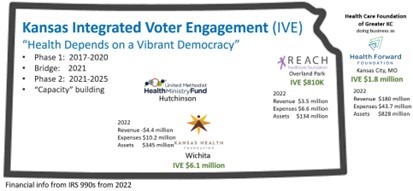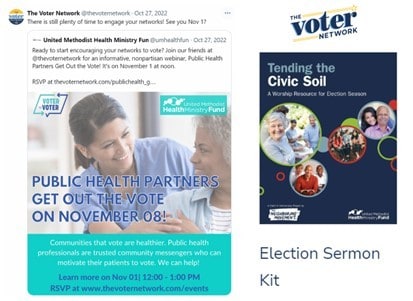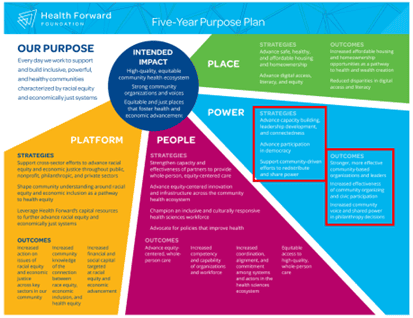Note: This is the second article in a four-part series on “Integrated Voter Engagement” in Kansas by Earl F. Glynn. The Sentinel is reprinting the series with Glynn’s permission. This article looks at the healthcare foundations funding IVE in Kansas.
Part 1 reviewed the history of IVE and how it started in Kansas.
Part 3 shows the Kansas nonprofits receiving funding to engage in IVE.
Part 4 reveals the impact of IVE on Kansas, and especially the “blueing” of Johnson County.
________________________________________
The first article in this series looked at the history of Integrated Voter Engagement as the starting point for understanding the nearly $9 million spent by three health foundations in Kansas from 2017 through 2025.
Part 2 of the series is about the healthcare nonprofits involved in Integrated Voter Engagement in Kansas. using IRS 990 financial information (2022). The United Methodist Health Ministry Fund does not file IRS 990s.
Wichita Area
In 1985, the nonprofit Wesley Medical Center in Wichita was associated with the United Methodist Church when it was sold to the for-profit Hospital Corporation of America (HCA). The proceeds from the 1985 sale resulted in the formation of two nonprofits: the Wesley Medical Endowment Foundation and the United Methodist Health Ministry Fund (UMHMF).
The Wesley Medical Foundation became the Wesley Foundation in 1986 and changed its name again to become the Kansas Health Foundation (KHF) by 1992.
A 2017 Associated Press article explained the differences between KHF and UMHMF:
- UMHMF “operates safety-net clinics in some parts of Kansas.”
- KHF “funds research and community-based programs to improve the overall health of Kansas residents.”
Wesley Medical Center sold for $265 million, from which $200 million in proceeds was used to create the Kansas Health Foundation (KHF), and $30 million was used to establish the United Methodist Health Ministry Fund (UMHMF).
KHF’s “purpose is to improve the health of all Kansans in accordance with the health care purpose and mission of the Great Plains Annual Conference of the United Methodist Church.”
The IRS requires KHF to file yearly IRS 990 tax statements, but Candid says UMHMF “is not required to file an annual return with the IRS because it is a religious organization.”
United Methodist Health Ministry Fund
From the UMHMF website:
The United Methodist Health Ministry Fund sparks conversation and action to improve the health and wholeness of all Kansans—especially those in rural and underserved communities.
UMHMF is a Hutchinson-based religious group with a focus “to help Kansans thrive with healthy minds, bodies, and spirits.” It assists KHF-funded organizations in integrated voter engagement efforts, but its spending is not a public record.
In 2022, UMHMF helped the Neighboring Movement and The Voter Network’s “Voter-to-Voter” efforts to get out the vote. It’s Tending the Civic Soil page provided a sermon guide and toolkit, which was shared by the Voter Network on their website.
The sermon guide provided links to both KSVotes.org, KSBallot.org and The Voter Network, all of which received integrated voter engagement funding from the Kansas Health Foundation.

In 2022 United Methodist Health Ministry Fund teamed with The Voter Network and The Neighboring Movement in get-out-the-vote efforts in Kansas. As a religious organization, this nonprofit is exempt from IRS reporting.
Kansas Health Foundation
From the KHF website:
The Kansas Health Foundation creates strategies and develops partnerships to improve health for all Kansans, by reducing health disparities and focusing on health equity. We envision a culture in which every Kansan can make healthy choices where they live, work and play.
KHF started out as a private foundation, but the IRS approved a change to a public charity, which was requested in 2015, but the final ruling occurred in 2020.
KHF was the key organization behind two phases of Integrated Voter Engagement:
- KHF Awards Funding for Voter Participation Initiatives, May 2016.
- Integrated Voter Engagement Request for Proposals, Aug. 2017.
- IVE Phase 1. Health Foundations Award $2.47 Million To Organizations Improving Health Outcomes and Promoting Civic And Voter Engagement. 2017-2020.
- Bridge funding. 2020-2021. Approx. $470K.
- IVE Phase 2. 2021-2025. Approx. $2.6 million.
Integrated voter engagement in the Kansas City Area
The sale of the nonprofit Health Midwest hospital system in 2003 to for-profit HCA resulted in the creation of two new nonprofit foundations:
- Health Care Foundation of Greater Kansas City, now doing business as Health Forward Foundation, and
- REACH Healthcare Foundation.
An Oct. 26, 2004, Kansas City Star article revealed the initial funding from HCA for these two nonprofits:
- Health Forward Foundation (under its original name) “received about $409 million in initial funding this year [2004].”
- “the REACH foundation this year [2004] received more than $99 million in initial funding.”
Health Forward Foundation
From the HFF website:
Every day we work to support and build inclusive, powerful, and healthy communities characterized by racial equity and economically just systems.
Health Forward is based in Kansas City, MO.
In Aug. 2023, Health Forward announced $4.9 million in grants to support and build community power.
That begs the question, is “community power” healthcare?
REACH Healthcare Foundation
Overland Park-based REACH focuses only on Wyandotte, Johnson, and Allen counties in Kansas and three counties in Missouri.
REACH Healthcare says it focuses only on three Kansas counties.
“Five years ago, the REACH Healthcare Foundation started an examination of its own investments and partnerships through the lens of racial equity—asking questions both internally and externally about the impact of REACH’s grantmaking practices on nonprofit leaders and Black-led, Black-serving organizations. The information gleaned from these conversations was the spark that ultimately created our Centering Black Voices initiative which sought to increase our investment and partnership with the Black community. Currently, we embrace our responsibility to reparative health philanthropy.”
Part 3 of this series will highlight the Kansas nonprofits receiving funding to engage in integrated voter engagement.





